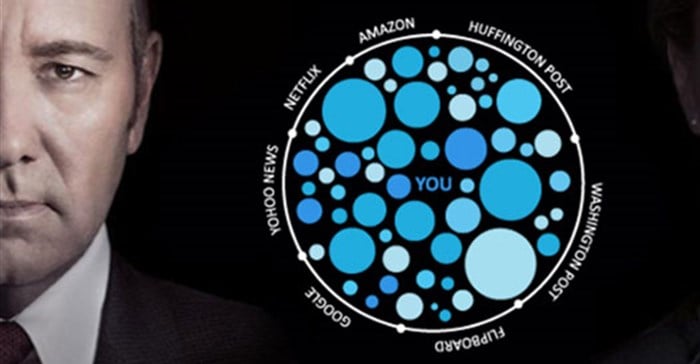
Subscribe & Follow
Jobs
- Experienced Model Booker (Agent) Cape Town
- B2B Marketing Consultant George
- Senior Marketing Coordinator Johannesburg
- Junior Copywriter and Proofreader Cape Town
- Marketing Manager Johannesburg North
- Email Marketing Specialist Johannesburg
- Client Services and Admin Johannesburg
- Creative Director Stellenbosch
- Marketing Manager Johannesburg
- Sales Project Manager Stellenbosch
What House of Cards teaches marketers about echo-chambers and filter bubbles

Now this may seem a little far-fetched, but it appears that the writers may have based their story-line on this article published in August 2015. This is all based on a trend that is well known in psychological and sociological circles. It’s the “echo-chamber effect.”
So what is the echo-chamber?
Essentially an echo-chamber is an environment in which opinions or information is transmitted and then reinforced within an “enclosed system” continually until those within the enclosed system believe that opinion to be unquestionably true. For example, if I believe that global warming is not man-made and that we didn’t walk on the moon, then I tend to be drawn to articles that reinforce my world view (also known as confirmation bias) I will then tend to read articles and listen to individuals who share my world view. In turn I may tweet or publish opinion pieces that echo my views that are in turn retweeted by those who share my views. This may result in a distorted world view where very little objective information comes my way.
Although conspiracy mongering may be an egregious example, one should question how one’s own world view is affected by the “filter bubble” of bias. How have you developed your views on organic food, fracking or the dangers of nuclear energy? Have you read the opposing views to your position? Internet activist Eli Pariser (who coined the term) talked about this in a great TED talk five years ago. Here, he talks about how newsfeeds like those of Facebook and the Huffington Post, customise the news based on our profile and how this is potentially damaging to society. Ironically in the internet – the world of free-information – the information is not free-flowing.
Although there are many reports of filter bubbles providing alleged political polarisation in many elections globally, (for example here and here), it should be noted that five randomised double-blinded tests have been conducted to show the affect that filter bubbles might have on swing voters in a variety of elections. The results all confirm a large influence.
So what can marketers learn from this?
Politics aside, this is really just marketing in a different guise. The effect of pushing parties, candidates or political agendas is no different than pushing brands and shows how effective a well organised digital marketing strategy could be. Here are four lessons for Marketers we can take from the drive towards personalisation as shown by the echo effect and filter bubble phenomena:
1. Know – and respect – your audience
Analyse customer data (behaviour, demographics, transactions, channel preference, media consumption), build a clear picture of their views and aspirations, and segment your customers data accordingly and use it in a respectful and responsible manner to – at best – appear in their "filter bubble" or – at least – prevent from being unfollowed or unsubscribed to based on your affiliation with any conflicting cause, beliefs or ideaology.
2. Use personalisation to improve the customer experience, but go "off filter" from time to time as well
According to Kate O'Neil, founder of KOInsights, personalisation should be used to make things easier to find on a site with a vast inventory of content or products. By filtering the content or products being shown to the user to those you think are most appealing or relevant to them, you show them you respect their time and you want them to find what they need quickly and easily. Showing me a customised view of content on Netflix based on my viewing history is convenient and helpful, because it filters down the hundreds of programmes down to the couple of dozen that I will probably find interesting.
However, according to O'Neill, as a marketer we shouldn't buy in entirely to the filter bubble concept by showing exclusively products or suggestions that are based on the customer profile. She says,"...there might be opportunity in exposing the customer experience to a little randomness where it doesn’t interfere with the customers’ intentions. A little unexpected cross-sell of something charming, a quirky-but-fun site feature, something surprising and fresh–these types of experiments with commercial randomness might be worth trying in your environment and seeing how customers respond."
3. Understand the echo chamber effect in your own online communities
By creating communities via social media around your brand consisting of brand adopters, adorers and advocates sharing their enthusiasm and opinions about your brand with each other, you create the potential for an ‘echo chamber’ that can further entrench your brand in the hearts and minds of your brand community, because in that microcosm ‘everyone’ loves your brand. However, beware, as one lives by the sword so can one die by the sword. Build a large community of followers of your brand and a small percentage of unhappy but vocal customers can quickly create the impression that ‘everyone’ is unhappy with your brand.
4. Beware the filter bubble
Personalisation of search results in Google and Facebook are restricting the total view of your brand. Depending on previous searches conducted by users, search results may deliver negative PR coverage or opinions to the user as opposed to a normal, unbiased mix of both good and bad. Eli Pariser cited an example in his TED talk in which one user searched Google for ‘BP’ and got investment news about British Petroleum while another user got information about the Deepwater Horizon oil spill, and that the two search results pages were "strikingly different."
We live in an increasingly polarised world thanks to advanced personalisation of messaging via social media and unashamedly biased news coverage. The echo chamber and filter bubble effects are distorting our reality. As marketers, you need to develop strategies with this in mind to minimise the negative effects of these phenomena on your brand and responsibly market to your audience in a manner that adds your brand to their specific view of the world.










